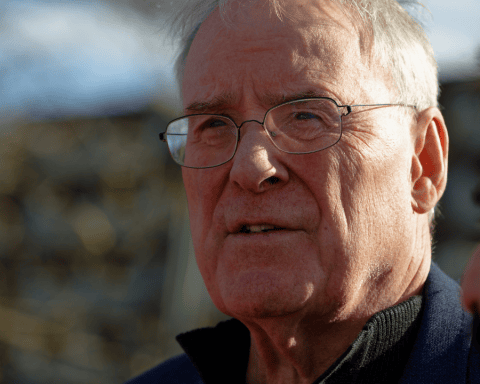An activist and environmentalist, Toronto lawyer Brian Iler has been the creative legal mind behind a host of cutting-edge renewable energy projects, social ventures and co-ops that have challenged received wisdom.
It turns out he’s also a sailor.
Sitting in the book-lined boardroom of his Queen West office, we’re meeting to discuss his recent environmental ventures. The conversation turns to teen climate activist Greta Thunberg and her crossing of the Atlantic, on her return to Europe from North America in November. It’s hard not to be impressed by his nautical knowledge.
“I’m following her day by day,” he explains with gusto. “She’s on a 48-foot catamaran. She just passed north of Bermuda. The winds look great. If anything, too much wind. She’s running 20 knots.”
Iler has steered many activist campaigns himself, dating back to the mid-1970s when he became counsel — and later joined the board — at Greenpeace Canada, just a few years after the group’s founding. “I acted for them in all the arrests that happened out of Darlington [nuclear power station, near Toronto], the big 1980 demonstration,” where an activist parachuted from an airplane into the plant site.
The protest movements of 1968 had inspired Iler to leave the engineering program at the University of Waterloo and enroll at York University’s Osgoode Hall. “I went to law school thinking there’s a way to make more of a difference in the world as a lawyer. And that turned out to be true.”
Around 1990, after more than a decade of acting as the go-to counsel for Ontario’s cooperative sector, Iler received a call from an engineer who wanted to erect wind turbines in Toronto. This was the genesis of TREC Renewable Energy Co-op, which birthed WindShare – whose turbine still spins at Exhibition Place.
Iler recalls the difficulty – bordering on the absurd – of finding a location for the windmill. Two sites near the waterfront were suggested, but local opposition shot them down. Then a naturalists’ group proposed Exhibition Place, but the zoning didn’t work. Eventually a helpful city official offered a creative solution: “‘Call it an amusement device.’ That’s what appeared on the building permit.”
Jumpstarting the revolution
Today, Iler is applying that spirited resourcefulness to efforts to retool General Motors’ Oshawa plant to produce electric vehicles for Canada Post. After the 2018 announcement of the facility’s closure, he chatted with the Canadian Worker Co-op Federation (CWCF) and wondered whether employees could buy the factory. “Kind of a long shot,” he admits. “But you never know once you put the idea out there what can happen.”
In spring 2019, CWCF commissioned a pre-feasibility study to look at the possibility of running the plant under workers’ control. “It became clear that . . . it really had to have huge government support to make it work,” Iler explains. “I think the figure was $1.9 billion. But [the study] was able to find examples of this having been done very successfully in other countries. The German post office went out to buy electric vehicles, found there wasn’t anything out there and bought a company to produce their own vehicles . . . And you can certainly have a worker ownership component.”
Iler is an expert on innovative funding models. Thanks in part to his efforts, Ontario has become a hotspot for renewable-energy-based community bonds, including SolarShare (a co-op that floats bonds to finance sun-powered arrays throughout Ontario) and ZooShare (a biogas co-operative). The Centre for Social Innovation – an incubator for more than 1,000 non-profits and social ventures in Toronto alone – credits Iler’s legal chops with securing funding for its hubs, now in New York as well.
If there’s a way to “access capital that sidesteps the traditional Bay Street model and goes directly to people who care about the issue,” as Iler puts it, he will sniff it out.
In GM’s case, he suggests it’s easier for government to mandate sustainability for its own trucks than for privately operated ones. Canada Post can simply say, “We’re going to convert our fleet to electric vehicles within X years, and we’re going to do it through an entity we create.”
CWCF believes Oshawa could produce and sell 150,000 electric vehicles over five years — about 1.4% of Canadian light-duty vehicle sales. Modest, to be sure, but potentially the start of a multibillion-dollar industry. The modelling also predicts significant employment growth — more than 13,000 jobs — and, by the fifth year, CO2 reduction of 400,000 tonnes.
Despite the plant’s scheduled closure in December 2019, Iler is optimistic. “With favourable government policy, we can do it here and get ahead of the curve. We know that GM sold a plant in the U.S. to Tesla. And the price was remarkably low. There’s such potential.”
Among the cars formerly produced in Oshawa was the Cadillac, one of the great symbols of worldly success. Today, with the climate crisis, the very meaning of success has changed. Now vehicles that tackle the emergency are the ones that confer status. Embrace of EVs would only enhance Canada Post’s reputation.
As I prepare to leave, the conversation turns again to sailing.
It’s “not for everyone,” Iler warns. “I’ve certainly been terrified on occasion. [But] the more you sail the more you realize that, as long as you avoid the really nasty stuff, the hurricanes, the boat will cope.” It’s similar to his faith in the ultimate soundness of the progressive enterprise.
“A lot of people get cynical,” he tells me. “I don’t.”





